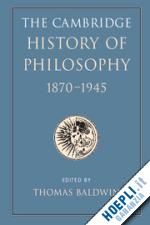Introduction; Part I. 1870–1914; Section 1. The Dialectical Situation in 1870: Positivism vs. Idealism: 1. The positivist tradition; 2. Neo-Kantianism: the German idealism movement; 3. Idealism in Britain and the USA; 4. Idealism in Russia; Section 2. The Argument Moves on: Pragmatism and the New Realisms: 5. Bergson; 6. Pragmatism; 7. Psychology: old and new; 8. The unconscious mind; Section 3. The New Logic and the Foundations of Mathematics: 9. The new logic: revival, reform, revolution; 10. Foundations of mathematics; Section 4. From Judgement to Language: 11. Theories of judgement; 12. The logical analysis of language; Section 5. Physics and the Philosophy of Science: 13. The atomism debate; 14. Theories of space-time in modern physics; Section 6. Philosophy of History and the Idea of Social Sciences: 15. The German debate and the Geisteswissenschaften; 16. From political economy to positive economics; 17. Sociology and the idea of social science; Section 7. Ethical Theory: 18. Utilitarians and idealists; 19. Nietzsche; 20. The new realism in ethics; Section 8. Legal and Political Theory: 21. Individualism vs. collectivism; 22. Marxism and anarchism; 23. Legal theory; Section 9. Philosophy and Religion: 24. Sceptical challenges to faith; 25. The defence of faith; Section 10. Philosophy and the Arts: 26. Art and morality: aesthetics at 1870; 27. Format and feeling: aesthetics at the turn of the century; Interlude: philosophy and the Great War; Part II. 1914–45; Section 11. Logic and Philosophy: The Analytic Programme: 28. Logical atomism; 29. Logical positivism; 30. The achievements of the Polish school of logic; 31. Logic and philosophical analysis; Section 12. From Idealism and Naturalism to Phenomenology and Existentialism: 32. The continuing idealist tradition; 33. Transformations in speculative philosophy; 34. Realism, naturalism and pragmatism; 35. French Catholic philosophy; 36. Spanish philosophy; 37. The phenomenological movement; 38. Heidegger; 39. Latin American philosophy; 40. Japanese philosophy; Section 13. Perception, Knowledge, Language, and the End of Metaphysics: 41. Sensible appearances; 42. The renaissance of epistemology; 43. The solipsism debates; 44. Language; 45. The end of philosophy as metaphysics; Section 14. Philosophy and the Exact Sciences: 46. First-order logic and its rivals; 47. The golden age of mathematical logic; 48. General relativity; 49. Scientific explanation; 50. The rise of probabilistic thinking; Section 15. Mind and its Place in Nature: 51. Vitalism and emergentism; 52. Behaviourism and psychology; 53. Gestalt psychology; 54. Wittgenstein's conception of mind; Section 16. Philosophy and The Social Sciences: 55. The methodology of the social sciences; 56. The rise of social anthropology; 57. Western Marxism and ideology critique; Section 17. Ethics and Religion: Emotivism, Intuitionism, and Authenticity: 58. From intuitionism to emotivism; 59. Philosophy of religion; Section 18. Literature and Aesthetic Theory: 60. Literature as philosophy; 61. Aesthetics between the wars: art and liberation; Section 19. The Decline of Europe: 62. The liberal democratic state: defences and developments, 1918–45; 63. Hans Kelsen and normative legal positivism; 64. The liberal democratic state – critics; Bibliographical appendix; Bibliography.












